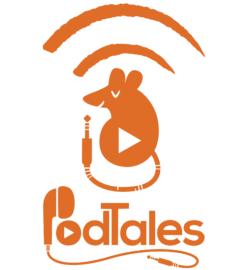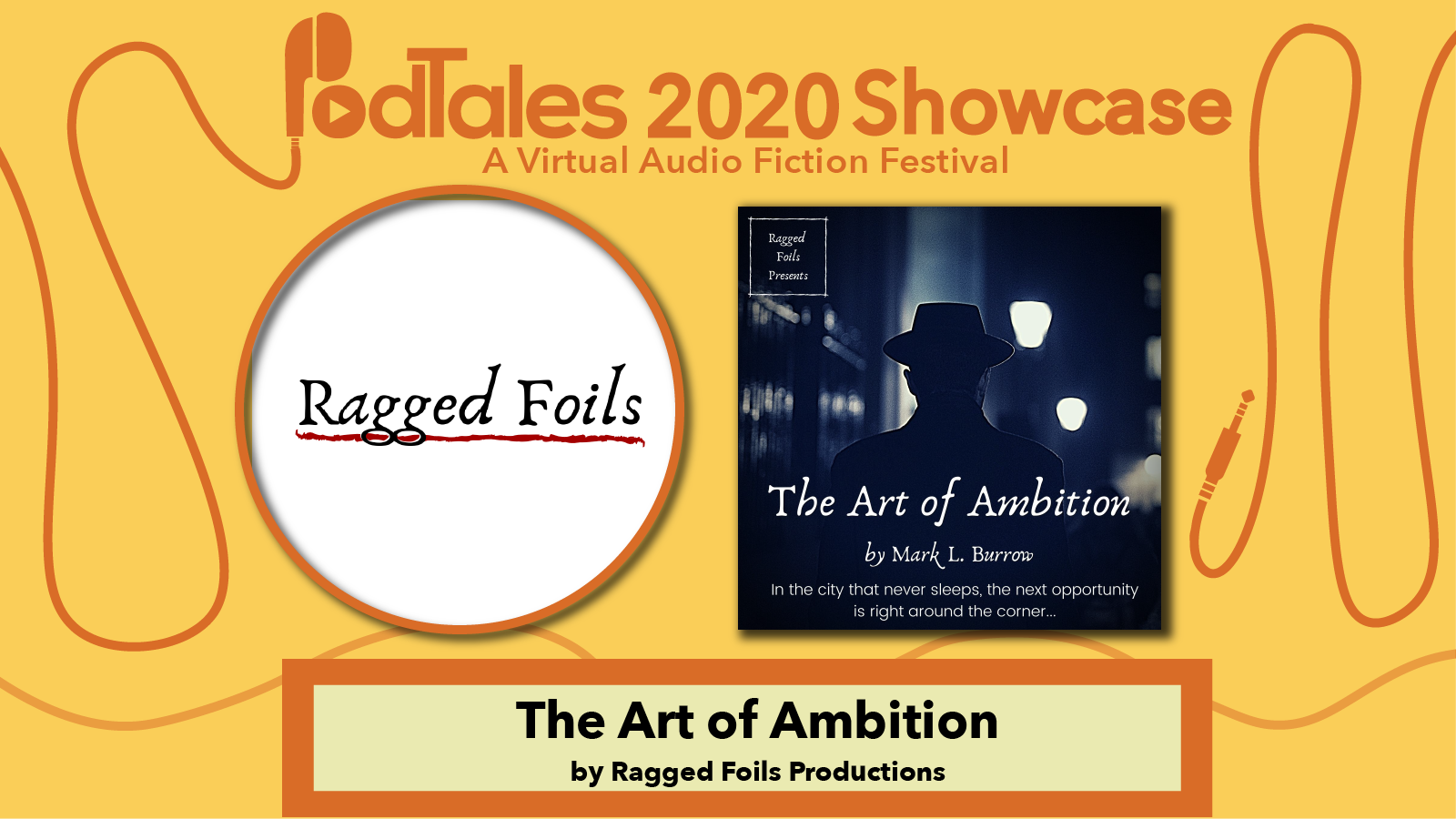Jeff Van Dreason
Hi there, this is Jeff Van Dreason and welcome to our first PodTales interview episode, we put the call to audio fiction creators to see if they’d be willing to answer some questions about their processes and challenges. Their response was overwhelmingly positive and a gigantic thank you to everyone involved. If you’re interested in being in a future episode, feel free to check the link in the show notes and skip question one because that’s what we use for this episode. So let’s get this started and meet just a small sample of the wonderful creators who answered question one. I’ll make sure to credit a complete list at the end of this episode and include information on them and their shows in the show notes.
Ali Hylton
My name is Ali Hylton. I am the creator of the audio drama Dining in the Void.
Tamara Kissane
My name is Tamara Kissane.
Andrea Klassen
This is Andrea Klassen. I’m the showrunner of Me and AU, I do everything except act on the show and sound design it.
Pippin Eira Major
Hi PodTales. I’m Pippin Eira Major writer, director and producer of Clockwork Bird.
Alex C. Telender
Alex C. Telender of the Ostium Podcast.
Andrew Wardlaw
I’m Andrew Wardlaw, I’m with Lamplight Radio Play.
Jeffrey Nils Gardener
Hey there PodTales team. This is Jeffrey Nils Gardener, pronouns they/them.
Amy Frost
I’m Amy frost, the narrator and producer of Achewillow.
Ann Slöan
Hey there, my name is Ann Slöan, she/her pronouns. My podcast is the Carlötta Beautox Chronicles.
Cai Gwilym Pritchard
My name is Cai Gwilym Pritchard. My associated audio fiction podcast is Chain of Being.
Tal Minear
My name is Tal Minear. And I use they them pronouns. I am the creator and producer of Sidequesting and What Will Be Here and I am the co-creator and producer of Light Hearts and Someone Dies in This Elevator.
Jordan Stillman
Hi, my name is Jordan Stillman. I am one of the producers of The Ordinary Epic.
Jeff Van Dreason
Here’s our first question. Has the pandemic pushed you to record differently? And are you doing more remote recording?
Ann Slöan
Has the pandemic pushed me to record differently? Yes, it has. We normally record in a studio in Los Angeles, that has become impossible to do so I’m approaching my third season which is upcoming in a totally different way with all of my actors recording remotely.
Andrew Wardlaw
Yeah, it has absolutely changed how we do stuff, specifically for us it changed story selection.
Tamara Kissane
I’ve spent most of my life as a multi hyphenate theatre artist. So my happy place is performing and rehearsing and hashing things out in the same room with other theater people.
Andrew Wardlaw
For the first time we did a piece that’s just one person telling a story. And I dropped off some equipment with the actor and they set themselves up in a homemade booth, and I directed them over the phone and it was…reasonably painful.
Tamara Kissane
Prior to COVID. All of my audio fiction pieces, even my one on one interviews have been recorded in studio altogether, where we can see facial expressions and gestures and sometimes even walk through the action and the staging of a particular moment in a scene. So there’s been a big shift in my work from almost entirely in-person experiences, to entirely online meetings and recordings.
Pippin Eira Major
The crazy thing about how the pandemic has altered our routines is that we started a podcast. About two months in we released the trailer for Clockwork Bird, it’s probably been a lot more stressful than it would have been otherwise, if we operate on the base assumption that starting an audio drama is always going to be stressful.
David Orión Pena
I started the whole podcast in the middle of the pandemic. So I took into account what would happen or what could happen if I needed more voices, and I did want more voices. So I kind of created a podcast around the idea just start with Deck’s voice and then some other characters start to slowly come into the podcast. So I just maybe needed one person for one episode, or once …one voice actor for a few episodes.
Jordan Stillman
We decided to do a mini series in between seasons one and two, and we did end up recording that remotely with our actors. We decided to go with more of a one on one approach. So the episodes are mostly isolated. It’s mostly just, you know, short vignettes with just one character at a time. That’s not the case for all of them. But that’s pretty much what we’re going for.
Tal Minear
The pandemic hasn’t really changed how I record at all because I was doing everything remotely from the beginning.
Alex C. Telander
While I was doing plenty of remote recording before with voice actors, as well as myself, I’m now incorporating Zoom most of the time. It’s great to be able to see voice actors’ faces and react with what they say and how they act. I found the recording options with zoom to be really good too. When we get around to recording the next seasons of Ostium and Circé in 2021, I fully plan to use zoom to make it feel like we’re all in the same place together.
Tamara Kissane
We usually have one zoom meeting, to read through the piece and chat and see each other and then all additional rehearsals are conducted on Zen caster where we cannot see each other.
Tal Minear
The only effect the pandemic has had on recording is that I’ve increased my recording schedule so that I can have looser deadlines. And mostly just give people a break when they need it, including myself.
Ali Hylton
So generally what we do is we have our table reads over Discord. We go through episodes scene by scene, and we talk about the scenes, if there’s any feedback that’s needed, I’ll give that right there. And then sometimes I’ll go and message them more. It just depends on the person and what’s been going on. And then after that each actor has about two weeks is usually what we put our deadline as? Um, and they can just record on their own time. They’ll send the audio in me, or one of the sound editors will listen through it. If there needs to be retakes on lines, we will get back to the actor. And yeah, it’s working so far.
Jeffrey Nils Gardener
For Unwell we have decided that we will be going into the studio. Now, we dramatically changed how we’re arranging that. For most of Unwell, we would do everything we could to get every single actor from the scene in together. And we’d all rehearse it together in the studio, and then record it. We are not doing that this time. We are in fact, recording with kind of the minimum number of people in the studio at a given time. We’ve instituted a bunch of new kind of safety procedures, obviously masks, cleaning equipment, cleaning surfaces, making sure only one person is touching the mics.
Cai Gwilym Pritchard
I use a website called behind the voice actors, so a lot of my voice actors from another country as well. And before like early episodes, I was recording with people like in person or just play with like classmates that from because I did Drama A level, which is like I guess like college, I think, if you’re American. And then I started using other people, and now that the pandemic is here, it’s exclusively remote recording except for when I get people that I live with to do lines and stuff. It’s been pretty good, honestly.
Andrea Klassen
Me and AU was always intended to be recorded remotely. And we did a lot of our recording before the covid 19 pandemic hit. The reason we went with remote recording is a couple of things. One of the biggest ones is that I live in a rural part of Canada where there isn’t really a whole lot of access to Sound Studios, or to actors who are interested in voice acting, hit all the demographics that I would like to hit, or just would be interested in making, like a queer rom com. If we’re being honest.
Pippin Eira Major
Because I knew from the get go that we weren’t going to be able to get together and record together as a team. Distance recording has been baked into the fabric of the show. In the script, certain characters spend more time together than others. And this is to compensate for the different ambient qualities of the recording spaces of each of our acting groups were split into two teams who record together. There’s me and my two housemates who live with me here. And then my dad and my sister.
Jeffrey Nils Gardener
We found, that actually the kind of shielding screen that you would use to reinforce the space of acoustically works great for also blocking some direct airflow. Now, obviously, that’s not going to, you know, block 100% of stuff. So, we are working to make sure that, you know, people are unmasked as infrequently as possible.
Jordan Stillman
We just wanted to make it as simple as possible, you know, make it easy for the actors, some of which who haven’t necessarily recorded remotely before.
Ann Slöan
I was very resistant to this because I do like getting the actors in the same room. I think there’s something wonderful about the dynamics that happen between the actors. We have recorded one episode remotely and I’m really pleased with the results. I have just cast a whole bunch of really wonderful actors were super professional, and they’re handling it great. So it is far beyond my expectations. I had a lot of fear about it. It’s turning out wonderfully.
Jeff Van Dreason
What tips do you have to pass on to other creators who were in the same situation?
Kyle Decker
When it comes to recording remotely, however, I would say two pieces of advice. The first one is have backups and if possible, have individual person backups, like it’s great to have a recording backup of everybody, but then if one person doesn’t have their audio working properly, then you have to basically choose, am I gonna have higher quality audio for everybody? And then this one person just isn’t there? Or am I going to lower the quality for everyone and do the backup? If you have individual file backups, like what zoom provides, then you can just replace the audio file for that one person.
Jeffrey Nils Gardener
I can talk a bit to what I think our goals are. And in kind of ranked order, I would say the most important, obviously, is that our actors and crew be as safe as possible. And that means following you know, all the CDC recommendations, we have consulted with an epidemiologist, actually an old friend of mine, who walked up through our recording procedures and said: Okay, here’s something you want to change. And at the end was like, well, you know, this looks a, this looks fairly good. This looks pretty good. So, you know, obviously, that’s, that’s our first priority.
Cai Gwilym Pritchard
I think just for tips to other people be really clear in how you want things to get across to try and be a bit poetic, because that’s how you get things across quite well is if you’re being really sort of trying to get the emotion across really well. You know, be be be specific and be, like accurate in your stage directions.
Kyle Decker
The second one is to have a system for matching up audio. Everybody does the 123 clap thing. I personally prefer having that file that I already set up and just having people say, “I am recording.” And then matching up their individual audio file with the bigger recording audio file, which is automatically lined up.
Jordan Stillman
I would say tips that we have is just sort of make sure you do a test. Testing is really important. And just sort of be open with the folks you’re working with about the quality that you need and scheduling and things like that.
Andrea Klassen
Build in some failure. Sometimes people will just have a bad audio day because, like, their heating system that they didn’t know their building had kicked on and three dogs fought outside.
Jeffrey Nils Gardener
Our second priority, though is is making people feel safe. And and that means often going kind of above and beyond what the recommendations are and and working to make sure that people know that for instance, if they’re feeling sick, even, you know, half an hour before a recording. They should call us and say hey, I’m not coming today, making sure people are as comfortable as possible, saying, Hi, I shouldn’t come to the studio.
Pippin Eira Major
Stuff like providing actors with really detailed character sheets prior to recording and getting as much direction as possible down at the stage of writing the script. This has really helped with getting what I want from actors when I can’t be in the same room as them whilst they’re recording.
Andrea Klassen
Try to do as much as you can upfront to prepare for success, which means that you aren’t necessarily gonna just jump in and record right away, you might need to spend some time working with your actors around what their space sounds like. If you’re hearing audio issues if the person who will be processing your end audio, if that isn’t you is hearing audio issues and those audio issues are genuinely going to be really difficult to work with. Things like that, as much as you can do them up front will definitely save you some time and some headache later on.
Pippin Eira Major
The biggest thing for the project has been keeping an open flow of communication, asking a lot for help and advice. That’s absolutely key for making big projects work under challenging circumstances and I think this situation has pushed the whole team and me in particular as a producer and director to find innovative solutions to problems which will hopefully serve me well, long after COVID has passed.
Jeffrey Nils Gardener
Also, you know, if someone is uncomfortable being in the studio, for whatever reason and not not asking someone to justify why they wouldn’t be in the studio, really respecting that and making sure that they know that we will record them separately or find some other solution, and I’m really glad that we’ve had, you know, folks step up and say, Hey, you know, I, I don’t, for whatever reason, feel comfortable doing this so you know, what accommodations can be made? And then making those accommodations.
Pippin Eira Major
On a very personal level, it’s actually been really helpful for me to have such a large scale project I can really lose myself and to occupy me during a time which has otherwise been so stressful and challenging.
Jeff Van Dreason
A gigantic thank you to all the creators who participated in this episode, including Cai Gwilym Pritchard of Chain of Being, Tal Minear of Sidequesting, What Will be Here, Light Hearts, and Someone Dies in This Elevator, Ann Slöan of The Carlötta Beautox Chronicles, Andrea Klassen of Me and AU and Station to Station, Jeffrey Nils Gardener of Unwell and Hartlife NFP, Pippin Eira Major of Clockwork Bird, Jordan Stillman of The Ordinary Epic, Kyle Decker of Quest Friends, Alex C. Telander of the Ostium Podcast. David Orión Pena of Dos: After You, Tamara Kissane Artist Soapbox, Masterbuilder, and The New Colossus, Amy Frost of Achewillow, Ali Hylton of Dining in the Void, and Andrew Wardlaw of Lamplight Radio Play. Thank you all again and we’ll be back in a few weeks and also keep an eye out for a panel from last year’s PodTales that will be appearing on the feed soon. Take care. Bye, everyone.


